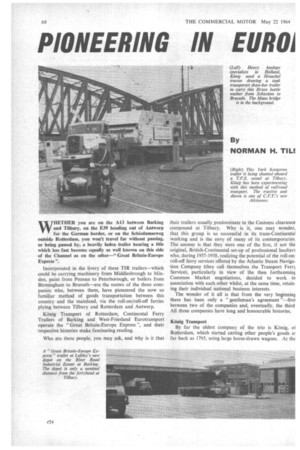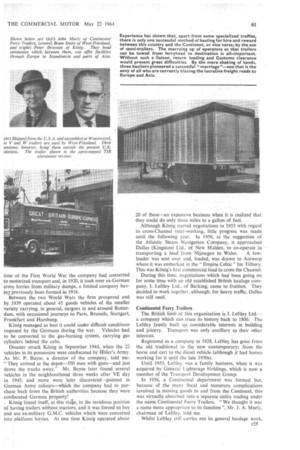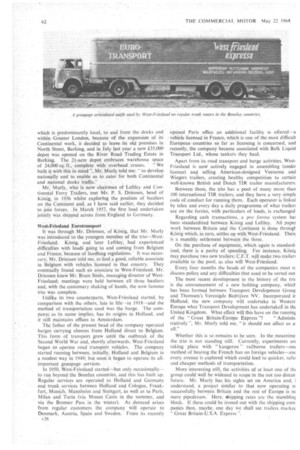PIONEERING IN EOM
Page 62

Page 63

Page 64

If you've noticed an error in this article please click here to report it so we can fix it.
By NORMAN H. TILI
W. HETHER you are on the A13 between Barking and Tilbury, on the E39 heading out of Antwerp for the German border, or on the Schiedamseweg outside Rotterdam, you won't travel far without passing, or being passed by, a heavily laden trailer bearing a title which has fast become equally as well known on this side of the Channel as on the other—" Great Britain-Europe Express ".
Incorporated in the livery of these TIR trailers—which could be carrying machinery from Middlesbrough to Minden, paint from Poznan to Peterborough, or boilers from Birmingham to Brussels—are the names of the three companies who, between them, have pioneered the now so familiar method of goods transportation between this country and the mainland, via the roll-on/roll-off ferries plying between Tilbury and Rotterdam and Antwerp.
Konig Transport of Rotterdam, Continental Ferry Trailers of Barking and West-Friesland Eurotransport operate the "Great Britain-Europe Express ", and their respective histories make fascinating reading.
Who are these people, you may ask, and why is it that
their trailers usually predominate in the Customs clearance compound at Tilbury. Why is it, one may wonder, that this group is so successful in its trans-Continental working and is the envy of many of its contemporaries The answer is that they were one of the first, if not the original, British-Continental set-up of professional hauliers who, during 1957-1958, realizing the potential of the roll-oni roll-off ferry services offered by the Atlantic Steam Naviga. tion Company (they call themselves the Transport Ferr) Service), particularly in view of the then forthcomin Common Market negotiations, decided to work in association with each other whilst, at the same time, retaining their individual national business interests.
The wonder of it all is that from the very beginninE there has been only a "gentleman's agreement "—first between two of the companies and, eventually, the third All three companies have long and honourable histories.
Kiinig Transport By far the oldest company of the trio is Konig, of Rotterdam, which started carting other people's goods a! far back as 1795, using large horse-drawn wagons. At the time of the First World War the company had converted to motorized transport and, in 1920, it took over ex-German army lorries from military dumps, a limited company havin:,Y previously been formed in 1916.
Between the two World Wars the firm prospered and by 1939 operated about 45 goods vehicles of the smaller variety carrying, in general, cargoes in and around Rotterdam, with occasional journeys to Paris, Brussels, Stuttgart, Frankfurt and Hamburg.
Konig managed as best it could under difficult conditions imposed by the Germans during the war. Vehicles had to be converted to the gas-burning system, carrying gas cylinders behind the cabs.
Disaster struck Konig in September 1944, when the 22 vehicles in its possession were confiscated by Hitler's Army, As Mr. P. Buyse, a director of the company, told me: "They arrived at the depot-100 men with guns—and just drove the trucks away." Mr. Buyse later found several vehicles in the neighbourhood three weeks after VE day in 1945, and more were later discovered—painted in German Army colours—which the company had to purchase back from the British authorities because they were confiscated German property! Kbrtig found itself, at this state, in the invidious position of having trailers without tractors, and it was forced to buy and use ex-military G.M.C. vehicles which were converted into platform lorries. At one time Konig operated about 20 of these—an expensive business when it is realized that they could do only three miles to a gallon of fuel.
Although Konig started negotiations in 1955 with regard to cross-Channel inter-working, little progress was made until the following year. In 1956, at the suggestion of the Atlantic Steam Navigation Company, it approached Dallas (Kingston) Ltd., of New Malden, to co-operate in
transporting a load from Nijmegen to Wales. A lowloader was sent over and, loaded, was drawn to Antwerp where it was embarked in the "Empire Celtic" for Tilbury. This was Konig's first commercial load to cross the Channel.
During this time, negotiations which had been going on for some time with an old established British haulage company, I. Leftley Ltd., of Barking, came to fruition. They decided to work together, although, for heavy traffic, Dallas was still used.
Continental Ferry Trailers The British limb of this organization is I. Leftley a company which can trace its history back to 1800. The Leftley family built up considerable interests in building and joinery. Transport was only ancillary to their other interests.
Registered as a company in 1928, Leftley has gone from the old traditional to the new contemporary; from the horse and cart to the diesel vehicle (a/though it had horses working for it until the late 1950s).
Until 1955, Leftley was a family business, when it was acquired by General Lighterage Holdings, which is now a member of the Transport Development Group.
In 1956, a Continental department was formed but, because of the many fiscal and monetary complications involved in moving goods to and from the Continent, this was virtually absorbed into a separate entity trading under the name Continental Ferry Trailers. "We thought it was a name more appropriate to its function ", Mr. J. A. Murly, chairman of Leftley, told me.
Whilst Leftley still carries out its general haulage work, c'75 which is predominantly local, to and from the docks and within Greater London, because of the expansion of its Continental work, it decided to leave its old premises in North Street, Barking, and in July last year a new £35,000 depot was opened on the River Road Trading Estate in Barking. The 21-acre depot embraces warehouse space of 24,000 sq ft., complete with overhead cranes. "We built it with this in mind ", Mr. Murly told me: to develop nationally and to enable us to cater for both Continental and national docks traffic."
Mr. Murly, who is now chairman of Leftley and Continental Ferry Trailers, met Mr. P. S. Driesseri, head of Konig, in 1956 whilst exploring the position of hauliers on the Continent and, as 1 have said earlier, they decided to join forces. In March 1957, the first load undertaken jointly was shipped across from England to Germany.
West-Friesland Eurotransport
It was through Mr. Driessen, of Konig, that Mr. Murly was introduced to the youngest member of the trio-WestrFriesland. Konig, and later Leftley, had experienced difficulties with load g going to and coming from Belgium and France;because of licetiting regulations. It was necessary, Mr. Driessen'tOld me, to find a good, reliable associate in Belgium with Vehicles licensed in that country. They eventually found such in associate in West-Friesland. Mr. Driesseri knew Mr. Bram Smits, managing director of WestFriesland; meetings were held between all three hauliers and, with the customary shaking of hands, the now famous trio was complete.
Unlike its two counterparts, West-Friesland started, by comparison with the others, late in life—in 1918—and the method of transportation used was the barge. The companyc as its name implies, has its origins in Holland, and it still maintains offices in Amsterdam. .
The father of the present head of the company operated barges carrying cheeses from Holland direct to Belgium. This form of transport grew until the outbreak of the Second World War and, shortly afterwards, West-Friesland began to operate road transplant vehicles. The company started running between, initially,. Holland and Belgium in a modest way in 1949; but soon it began to operate its allimportant groupage services.
In 1950, West-Friesland started—but only occasionally— to run beyond the Benelux countries, and this has built up. Regular services are operated to Holland and Germany and trunk services between Holland and Colcigne, Frankfurt, Munich, Mannheim and Stuttgart, as well as to Paris, Milan and Turin (via Mount Cenis in the summer, and via the Brenner Pass in the winter). As demand arises from regular customers the company will operate to Denmark, Austria, Spain and Sweden. From its recently c26 opened Paris office an additional facility is offered—a
• vehicle licensed in France, which is one of the most difficult European, countries so far as licensing is concerned, and recently, the company became associated with Bulk Liquid Transport Ltd., whose tankers they haul.
Apart from its road transport and barge activities, WestFriesland is noW actively engaged in assembling (under licence) and selling American-designed Veenema and Wiegers trailers, creating healthy competition to certain well-known British and Dutch T1R trailer manufacturers
Between them, the trio has a pool of many more than 100 international T1R trailers, and they have a very simpk code of conduct for running them. Each operator is linked by telex and every day a daily programme of what trailers are on the ferries, with particulars of loads, is .exchanged
Regarding cash transactions, a pro forma system has been standardized between Kanig and Leftley. All paper work between Britain and the Continent is done througt Kiinig which, in turn, settles up with West-Friesland. Then is a monthly settlement between the three.
On the purchase of equipment, which again is standard. ized, there is a parity of spending. For instance, KoniE may purchase two new trailers; C.F.T. will make two trailers available to the pool, as also will West-Friesland.
Every, four months the heads of the companies meet tc discuss policy and any difficulties that need to be sorted out The most recent development in the history of the tric is the announcement of a new holding company. whict has been formed between Transport Development Grout and Thomsen's Verenigde Bedrijven NV. Incorporated ir Holland, the new company will undertake in Westerr Europe what Transport Development has undertaker' in th( United Kingdom. What effect will this have on the runnirn of the "Great Britain-Europe Express "? " Adminis. tratively ", Mr. Murly told me, "it should not affect us al all."
Whether this is so remains to be seen. In the meantime the trio is not standing still. Currently, experiments an taking place with " kangerou " railborne trailers—oni method of beating the French ban on foreign vehicles—anc every avenue is explored which could lead to quicker, safei and cheaper methods of transportation.
More interesting still, the activities of at least one of the group could well be widened in scope in the not too distan future. Mr. Murly has his sights set on America and, I understand, a project similar to that now operating s( successfully between Britain and the rest of Europe is n( mere pipedream. Here, iihipping rates are the stumbfin block. If these could be ironed out with the shipping corn panics then, maybe, one day we shall see trailers markec Great Britain-U.S.A. Express




























































































































